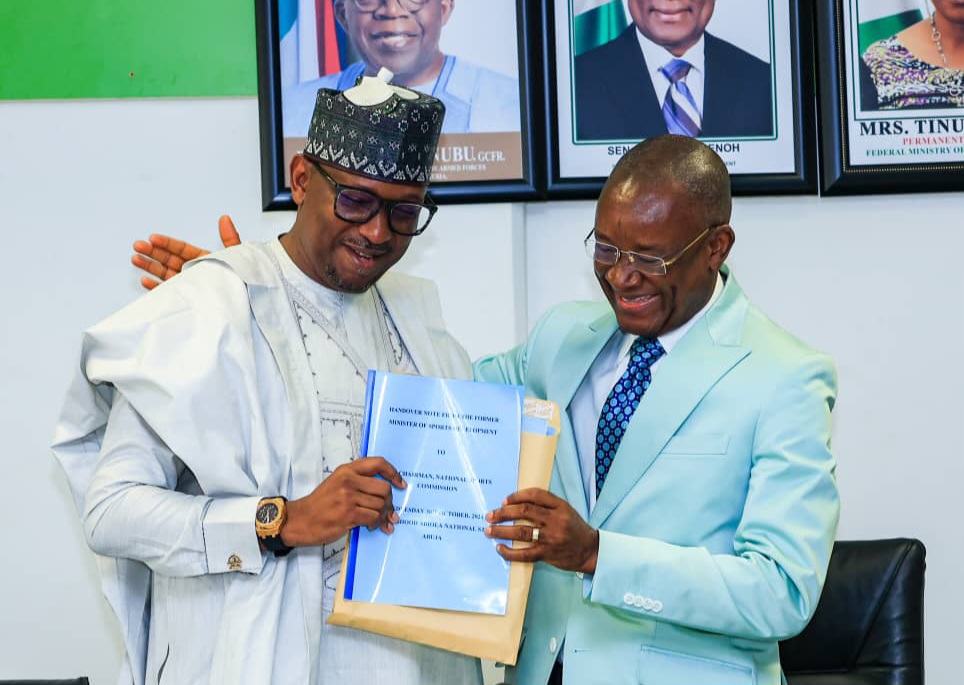By Kayode John
Newly-appointed Chairman of the National Sports Commission (NSC) Shehu Dikko says Nigeria’s path towards a sustainable sports economy has begun but emphasised that a change of approach is key towards achieving the set goals.
Dikko said this on Wednesday at the official handing over of the running of sports in Nigeria to him by the former Minister of Sports John Enoh, in Abuja.
“History has a way of coming full circle because in 2008 I was a consultant to the House of Representatives and was responsible for the drafting of the National Sports Commission Bill, a job I did pro-bono and about 16 years down the line I have here with the assignment to implement the work I assisted to put together,” he said.
“The objective of Mr President is to harness the full potentials of the Sports Economy in Nigeria.
“And we have to first change our mindset from the fixation of just competitions and winning medals and come back and fix our Domestic Sports Development.
“When we set the foundation right the results and the winning of medals will naturally come in a sustainable manner and that should be the new mindset.
“We cannot continue to run in cycles so we need to have a different approach from day one because in my view and indeed the firm view of President Bola Ahmed Tinubu, competitions is what we call ‘consumption’ because we just take scarce resources and burn out abroad without any impact on the domestic sports development ecosystem and the Nigerian Economy.
“But we have to go back to ‘Production’ which is deliberate Sports Development, where we set the structure right, set the framework and put together good parameters to have a sustainable Sports Development which will naturally give us a solid Sports Economy and indeed guaranteed competitive participation at all competitions and medals.”
Dikko highlighted his strategic approach to governing the NSC, itemising the key steps he and his team will take to raise the profile of Nigerian sports.
“This is the reason why our administration will be focused on three pillars including running sports as a national asset, that is entitled to special privileges, regulations and concessions to drive growth and development to open its potentials to be a key driver of the economy across all sectors, a vehicle for achieving national cohesion and projection of the positive and unique attributes of our culture and national identity,” the former League Management Company Chairman added.
“We have to also work on legislations and regulations so as to set the framework to enable the Industry to grow effectively like what happened in the communications industry some years back.
“The other pillar is investing in purposeful world class infrastructures that will provide an enabling environment for Growth. These infrastructures must be deliberate with maintenance culture and span from world class infrastructure for professional sports to community infrastructure to drive grassroots sports and mass participation across the country.”
The NSC Chairman stressed that the vision of the current administration is for sports to be a contributor to the nation’s economy.
“The thinking of Mr President is that after having some of all these in place we should be able to measure the country’s sports by its contribution to the nation’s GDP by at least three percent (3%) addition via sports and the number of jobs sports and its value chain are providing in country in the next four to five years and indeed our competitiveness across all competitions and tournaments,” Dikko stated.
“Thus, it’s a visionary decision for Mr. President to approve the return of the National Sports Comission to drive this process and objectives in line to the best international practices and standards devoid of any beureucratic bottlenecks but absolute professionalism.”
He highlighted some immediate actions plan to drive the agenda and mandate of the NSC to include the implementation of the desired policies and framework envisaged, facilitating the private sector participation in the sector through investment in sports production and infrastructure development.
Restructuring and capacity building initiatives of the sports federations for optimal performance, engagement of competent personnel and partners to deliver on the mandate; policy development by putting together strategies, policies and legislations to protect and support sports development in the country are the other immediate actions he will take.
According to him, other strategic plans are: “Institutional support by ensuring that the NSC seamlessly assume the assets and liabilities from the defunct Federal Ministry of Sports and most critically, commence process to amend/update the NSC Act to align with international best practices, creating a professional governance framework, resolved funding challenges of sports in Nigeria and provide the enabling environment to drive President Bola Tinubu’s vision of creating a sustainable sports economy in Nigeria.”
On October 23, President Tinubu appointed Dikko, a former 2nd vice president of the Nigeria Football Federation (NFF) as the Chairman of the NSC, following the scrapping of the Ministry of Sports Development and redeployment of Enoh to the Ministry of Trade.



